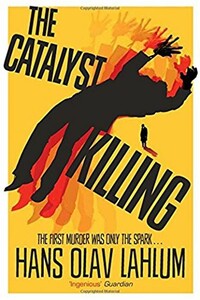Satellite People | страница 55
I nodded in agreement. From what I had heard about Magdalon Schelderup thus far, he was certainly not someone one should try to swindle.
‘But you do perhaps remember what happened on 14 February 1949?’
He nodded and swallowed.
‘Yes, very clearly, unfortunately. Magdalon was absolutely livid in his own peculiar calm way, as he could be when he lost money or felt that he had been cheated by someone. He said he would call the police unless I could put the money on the table in the course of the working day – with interest. I confessed to him that I had drunk or played the money away. Then I got down on my knees in front of his desk, weeping, and begged him to spare me for the sake of my motherless little boy. I promised that I would pay him back every krone with interest over time. I explained that my assets were worth barely a tenth of the sum and that I would not be able to earn the money if I was found guilty of fraud. He said neither yes or no, just told me to get out of his sight. He added that I might as well crawl out. So I did as he said. I crawled out of his office on my hands and knees and did not stand up until I was out in the corridor and almost tripped up his wife.’
The memory was obviously deeply uncomfortable and distressing. Hans Herlofsen wiped the sweat from his brow and took a short pause before continuing.
‘There was absolutely nothing in the world I could do, so I went back to my own office and carried on working as best I could. All day I waited for the police to knock on my door. And eventually it was Magdalon himself who came in, without knocking, at the end of the afternoon. He put down two written documents on the desk in front of me. One was a confession to fraud. The other was a contract in which I declared that I owed him 95,000 kroner, of which 87,123 was an ‘unpaid loan’ and 7,877 was ‘unpaid interest’. The amount was to be paid back with interest at 10 per cent, in annual instalments of 10,000 kroner. And my house and all my other assets were held as collateral in the event of any default in payment. I was given half a minute to sign or he would call the police. I signed, and he left the office holding both the documents. I have never seen them since, but I have been conscious of their existence every day of my life. Year after year has gone by without us ever mentioning the matter directly. I have been his slave – I had to carry on working for him for whatever wage he himself decided to pay me and could never answer back, no matter what bile he spat at me. My life has been an endless toil, a never-ending struggle to meet those payments on 31 December every year. And in 1964, I had to pawn my wife’s last pieces of jewellery between Christmas and New Year in order to make it.’




